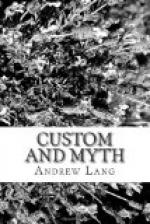’What makes mythology mythological, in the true sense of the word, is what is utterly unintelligible, absurd, strange, or miraculous.’ So says Mr. Max Muller in the January number of the Nineteenth Century for 1882. Men’s attention would never have been surprised into the perpetual study and questioning of mythology if it had been intelligible and dignified, and if its report had been in accordance with the reason of civilised and cultivated races. What mythologists wish to discover is the origin of the countless disgusting, amazing, and incongruous legends which occur in the myths of all known peoples. According to Mr. Muller—
There are only two systems possible in which the irrational element in mythology can be accounted for. One school takes the irrational as a matter of fact; and if we read that Daphne fled before Phoebus, and was changed into a laurel tree, that school would say that there probably was a young lady called Aurora, like, for instance, Aurora Konigsmark; that a young man called Robin, or possibly a man with red hair, pursued her, and that she hid behind a laurel tree that happened to be there. This was the theory of Euhemeros, re-established by the famous Abbe Bernier [Mr. Muller doubtless means Banier], and not quite extinct even now. According to another school, the irrational element in mythology is inevitable, and due to the influence of language on thought, so that many of the legends of gods and heroes may be rendered intelligible if only we can discover the original meaning of their proper names. The followers of this school try to show that Daphne, the laurel tree, was an old name for the dawn, and that Phoibos was one of the many names of the sun, who pursued the dawn till she vanished before his rays. Of these two schools, the former has always appealed to the mythologies of savage nations, as showing that gods and heroes were originally human beings, worshipped after their death as ancestors and as gods, while the latter has confined itself chiefly to an etymological analysis of mythological names in Greek, Latin, and Sanskrit, and other languages, such as had been sufficiently studied to admit of a scientific, grammatical, and etymological treatment.
This is a long text for our remarks on Hottentot mythology; but it is necessary to prove that there are not two schools only of mythologists: that there are inquirers who neither follow the path of the Abbe Banier, nor of the philologists, but a third way, unknown to, or ignored by Mr. Muller. We certainly were quite unaware that Banier and Euhemeros were very specially concerned, as Mr. Muller thinks, with savage mythology; but it is by aid of savage myths that the school unknown to Mr. Muller examines the myths of civilised peoples like the Greeks. The disciples of Mr. Muller interpret all the absurdities of Greek myth, the gods who are beasts on occasion, the stars who were men, the men who become serpents or deer,




